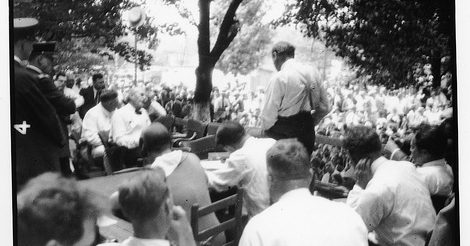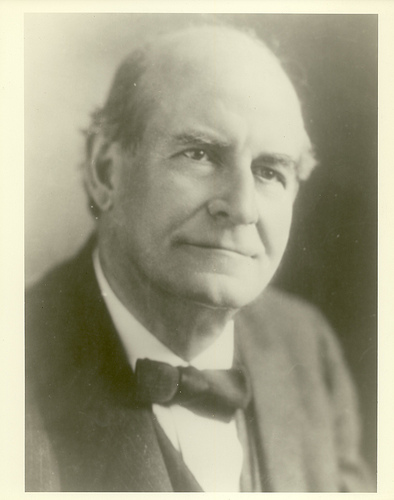
When I chose When Science and Christianity Meet for our book discussion, I thought it would keep us away from current politics. I figured The War on Science had given us enough of that for a while. Yet as the historical narrative encroaches further on the present, the relevance becomes harder to deny. If politics applies truth to arrive at policies, and if science is a way of discovering truth, then the two will inevitably be intertwined. That was the case in the Scopes trial nearly a century ago, and it’s the case now.
In his essay “The Scopes Trial in History and Legend,” Edward Larson helpfully places the Scopes trial within a larger conversation. As a criminal matter, the trial was fairly straightforward; Scopes clearly broke the law on teaching evolutionary biology. But why was there such a law in the first place? And why did the litigation of such a simple criminal indictment attract the attention of legal luminaries and the national press? Those are the questions Larson prompts us to ask and helps us to answer.
His portrait of William Jennings Bryan particularly grabbed my attention. Bryan, like so many of his contemporaries and ours, was primarily concerned with how science was applied. Justice should flow from truth; if the fruits of evolutionary biology are unjust, then it must not be true. I can appreciate that logic and the passion to stem injustice. At the same time, it is easier for me to look back and see how social Darwinism and eugenics have been rejected by the scientific community and society as a whole and so conclude that the fruits of evolutionary biology are not necessarily unjust. Inclusivity sits beside common descent in our public school curricula and many students seem to be learning both just fine. Indeed, common descent links us all together as a species in a way that was not immediately obvious to everyone in the centuries before Darwin, as we discussed previously.

Last week I wished for a sequel to Jon Roberts’ essay that followed Christian thought on psychology into the present. This week I actually came across some follow-up in the form of a piece for The Atlantic by Michael Gerson. The present-day evangelical support of the current administration concerns Gerson most of all, but in trying to understand that support he traces the history of the evangelical movement including the Scopes trial and Bryan. He also visits some of the other science topics we’ve discussed in this series, including the unity of humanity. He agrees that teaching evolutionary biology has not undermined society and laments the missed opportunity for evangelicals to oppose the misapplication of that science into policy rather than the policy itself.
Gerson also observes that it is not just the truth about our past that informs our present policy, but also the truth about our future. If the world as we know it will soon pass away, then policies with short-term costs for long-term benefits are of little use. Unfortunately, whatever uncertainty we have about the past, our uncertainty about the future is even greater. We may still be in this world for the long haul. So perhaps we should focus on policies that maximize future opportunities. That way we stand a chance of being prepared for a wide number of things the future might throw at us.
Returning to our book, I also thought Larson did a great job illustrating the ways legal proceedings and jury trials fall short of being able to decide broad scientific questions. Trials need to decide specific, narrow questions. Judge and jury cannot be brought up to speed on years of scientific training in a few weeks or even months. And the hearts and minds of an entire country’s citizens are not bound by any verdict. Thus questions of what to teach in public school biology classes continues to be a topic of judicial and legislative debate.
So if a court case isn’t up to the task, how should we decide scientific questions as they pertain to matters of policy? I look forward to hearing from you in the comments below, or face-to-face next week (details below).
We’re going to have one more video chat to wrap up our discussion of this book. I hope you can join us in next week on 4/25 at 7:30pm Eastern.
Andy has worn many hats in his life. He knows this is a dreadfully clichéd notion, but since it is also literally true he uses it anyway. Among his current metaphorical hats: husband of one wife, father of two teenagers, reader of science fiction and science fact, enthusiast of contemporary symphonic music, and chief science officer. Previous metaphorical hats include: comp bio postdoc, molecular biology grad student, InterVarsity chapter president (that one came with a literal hat), music store clerk, house painter, and mosquito trapper. Among his more unique literal hats: British bobby, captain’s hats (of varying levels of authenticity) of several specific vessels, a deerstalker from 221B Baker St, and a railroad engineer’s cap. His monthly Science in Review is drawn from his weekly Science Corner posts — Wednesdays, 8am (Eastern) on the Emerging Scholars Network Blog. His book Faith across the Multiverse is available from Hendrickson.

It seems to me that as Christians our passion should be for truth — all truth. Such a passion also implies holding our views in both science and theology with humility, and a willingness to listen and be corrected. It is this passion for truth that we can and must communicate. Secondly, any application of scientific or theological truth should be consistent with God’s purposes and desires as most fully revealed in the life and words of Christ.
Keith – Thanks for these thoughts. I found your connection between passion and humility to be interesting. Ultimately, I agree that we need both together. I wonder though if it is easy to confuse passion for truth with passion for our particular understanding of the truth, which can make it harder to be humble. Do you find that to be the case? If so, do you have any recommendations for how to keep the focus on truth in order to maintain humility?
Yes, I agree that it is easy to confuse our particular understanding with truth. I believe that one way to keep ourselves open to change and correction is to be in community — a diverse faith community. I think that being in community with those with whom we disagree provides a protection against significant error. Part of this is being willing to ask, and be asked, difficult questions. It is one way that the Holy Spirit works.
Keith – thanks for that answer. I think finding those kinds of communities can be challenging, but I agree that they are valuable for the reasons you gave.